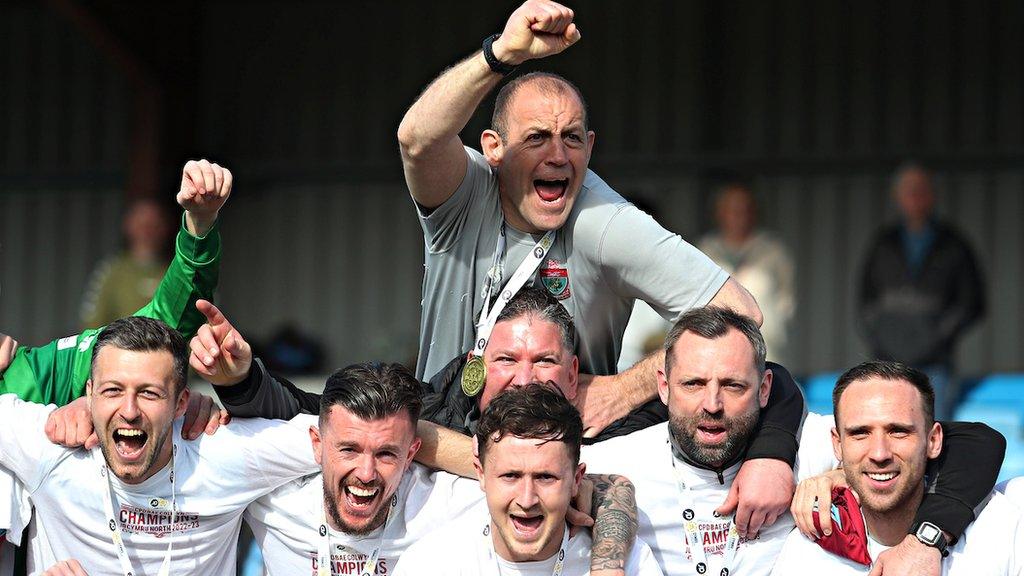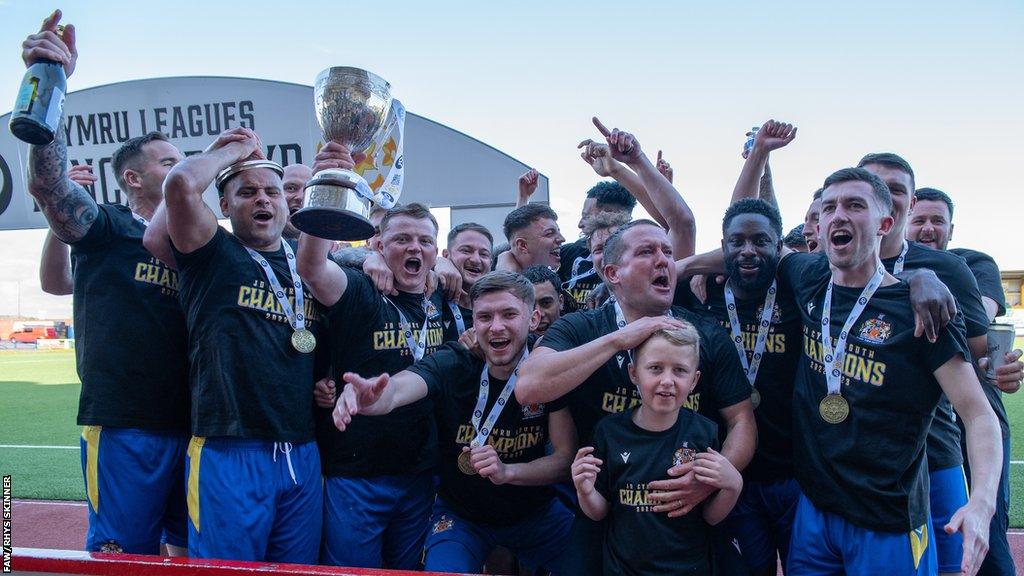Cymru Premier: Barry Town and Colwyn Bay's sliding doors moment
- Published

Colwyn Bay manager Steve Evans and players celebrate the club's promotion to the Cymru Premier.
Barry Town and Colwyn Bay are the newly promoted sides ahead of the new Cymru Premier season, which kicks off this weekend.
Both were among a group of clubs dubbed the 'Irate Eight' for defying the Football Association of Wales and refusing to join the proposed League of Wales in the early 1990s.
But the two clubs ultimately took very different paths to reach where they are today.
Having refused to join the league in August 1992, Barry and the Bay, along with Caernarfon and Newport, opted for exile in England to continue playing non-league football in England.
Barry relocated to Worcester City, some 95 miles away and would go under the Welsh name Barri, while Bay spent a season at Northwich Victoria's Drill Field in Cheshire.
"It was a huge decision to take [but] at the time it was the right decision," said club director Dilwyn Roberts, who was among the supporters who followed the club in exile.
"It was the element of doubt. There had never been a fully national league in Wales and the doubt was what happens if it doesn't work?
"It was a very, very successful era for the Bay and it would have been a shame, with all the work that had gone to achieve that, had that gone out of the window.
"Committee members made huge personal and financial sacrifices to go into exile and it must have been a strain. As supporters, we were aware of it but not the depth of it."
Barry, who had played in the Southern League for more than 60 years before a brief return to the Welsh League during the 1980s, also saw the benefits of playing in England.
"The owners at the time felt that was the best place to be, with more competition," said David Cole, Barry Town United's current secretary, who has been involved with the club for 33 years.
"They decided to take on the FAW and try and to remain in Wales - only Merthyr managed to legally stay in Wales with the rest of us having to go into England to play.
"The travel back and forth to Worcester for home games and the west Midlands for away games, it was just too much.
"We had a split squad at the time so half of the boys that were playing out of Worcester came from south Wales and the rest came from the west Midlands.
"They were training separately and playing together on a Saturday, so it wasn't ideal.
"So Neil O'Halloran, the owner of the club at the time, decided it was best if we came back to Wales."
The summer of 1993 would ultimately prove to be a sliding doors moment for the two clubs.
A season in exile had been tough with Barry deciding to return to Welsh competition while the Bay remained in exile, albeit moving to Ellesmere Port.
Barry's first season back in Wales would be memorable.
"That was a hugely successful season," Cole added.
"We entered five competitions, won four of them and the fifth one they just didn't play the final.
"We won the Welsh Cup (beating Cardiff City), the Welsh League, the League Cup and the FAW Trophy."
Within three years Barry would win the first of seven Welsh titles, dominate the domestic game and regularly represent Wales in Europe and face opposition including Dynamo Kyiv, Porto and Aberdeen.

Barry Town, under former manager Lee Kendall, returned to the Cymru Premier after a season's absence.
"It was the right decision at the right time," Cole says of the decision to move back to Wales in 1993.
"Our success in the League of Wales actually proved that point."
The Bay, meanwhile maintained their place in the Northern Premier League Premier Division for 10 years before being hit by financial problems and relegation.
But two consecutive promotions saw them reach the National League North in 2011, where they spent four seasons.
"We were two promotions from the Football League, whether that was a pipedream or an impossible dream, who knows," Roberts added.
"But the ambition was there and the dream was there and I think we did very well as a club to maintain that level of football for as along as we did, for a town the size of Colwyn Bay."
But two successive relegations saw the club drop back into the Northern Premier League first division and financial struggles resulted in the Seagulls return to Welsh football after 35 years in 2019.
Allow X content?
This article contains content provided by X. We ask for your permission before anything is loaded, as they may be using cookies and other technologies. You may want to read X’s cookie policy, external and privacy policy, external before accepting. To view this content choose ‘accept and continue’.
"There was a lot of soul searching but, at the end of the day, it was a decision that had to be made," Roberts said.
"I suspect, had we not made that decision, it's possible that Colwyn Bay Football Club wouldn't exist any more in the way we know and love it.
"I would say 99.9% of the fans have embraced coming back into the Welsh system.
"I'm really looking forward to the big kick-off, visiting new grounds and how we acquit ourselves against the best teams in Wales."
Although the Cymru Premier is new territory for Colwyn Bay, manager Steve Evans has a long and successful association with the league.
Evans, the former Wales international, had two spells with The New Saints where he won seven Cymru Premier titles.
He became Bay manager in January 2022 and last season guided the club to the Cymru North title, losing only one game all season as they secured promotion.
"It's a great challenge," said Evans. "Last year was special, going all those games unbeaten.
"It's a much bigger step up this season and a challenge which we understand is going to be a tough one but one that we're relishing and looking forward to.
"We'll enjoy the journey and see where it takes us."
Bay host Caernarfon Town in their opening game on Sunday, 13 August while Barry are away to Bala Town the previous day, with former Wales defender Steve Jenkins succeeding Lee Kendall as manager.